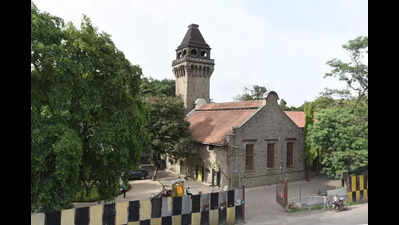75% of JCB's global engineering work now happens in Pune: CEO | Pune News - Times of India

Pune: Managing director and CEO of JCB India Deepak Shetty said on Saturday that 75% of JCB's global engineering work was done from the city, with over 700 engineers working at the company's design centre. Shetty was speaking at the fourth foundation day celebrations of College of Engineering, Pune Technical University (CoEPTU)."From India, we export to more than 130 countries around the world. Last year, our largest number of exports of more than 10,000 machines was to the US. We are one of the unique companies where we did not bring a product from outside and put it in India. We engineered and developed a product from the ground up," said Shetty, adding that JCB's six factories in India, of which two are in Pune, were multiple times better on the quality standards compared to any of the 23 facilities that it has around the world, including 11 in the UK, China, Brazil, and the US.
Shetty cited JCB India's factory in Ballabgarh, outside Delhi, which produces one machine every three minutes. "Almost 20 years ago, when the Pune facility was set up, we had some 20-25 people from the UK who came down to set up this facility. We are investing almost a billion dollars in a new facility in Texas, the US, for manufacturing machines. In a board review meeting recently, our group CEO asked me to send at least 50 to 100 good engineers from India to help build this facility," said Shetty.
He said that nations that lead in science and technology will shape global discourse and influence international policy. "In this context, institutions like CoEPTU have a crucial role to play," Shetty said.Conceding that the university has lost a bit of sheen, Vinayak Pai, managing director and CEO of Tata Projects and chairman, board of governance, CoEPTU, said, "Unless we accept that we have to do something and accept the reality we won't be able to change."
Pai said that the aim of the institute is to shift from a UG-focused college to a more research-oriented structure by increasing postgraduate and doctoral intake, an example being its upcoming Chikhali campus.
Pune: Managing director and CEO of JCB India Deepak Shetty said on Saturday that 75% of JCB's global engineering work was done from the city, with over 700 engineers working at the company's design centre. Shetty was speaking at the fourth foundation day celebrations of College of Engineering, Pune Technical University (CoEPTU)."From India, we export to more than 130 countries around the world. Last year, our largest number of exports of more than 10,000 machines was to the US. We are one of the unique companies where we did not bring a product from outside and put it in India. We engineered and developed a product from the ground up," said Shetty, adding that JCB's six factories in India, of which two are in Pune, were multiple times better on the quality standards compared to any of the 23 facilities that it has around the world, including 11 in the UK, China, Brazil, and the US.
Shetty cited JCB India's factory in Ballabgarh, outside Delhi, which produces one machine every three minutes. "Almost 20 years ago, when the Pune facility was set up, we had some 20-25 people from the UK who came down to set up this facility. We are investing almost a billion dollars in a new facility in Texas, the US, for manufacturing machines. In a board review meeting recently, our group CEO asked me to send at least 50 to 100 good engineers from India to help build this facility," said Shetty.He said that nations that lead in science and technology will shape global discourse and influence international policy. "In this context, institutions like CoEPTU have a crucial role to play," Shetty said.Conceding that the university has lost a bit of sheen, Vinayak Pai, managing director and CEO of Tata Projects and chairman, board of governance, CoEPTU, said, "Unless we accept that we have to do something and accept the reality we won't be able to change." Pai said that the aim of the institute is to shift from a UG-focused college to a more research-oriented structure by increasing postgraduate and doctoral intake, an example being its upcoming Chikhali campus.







